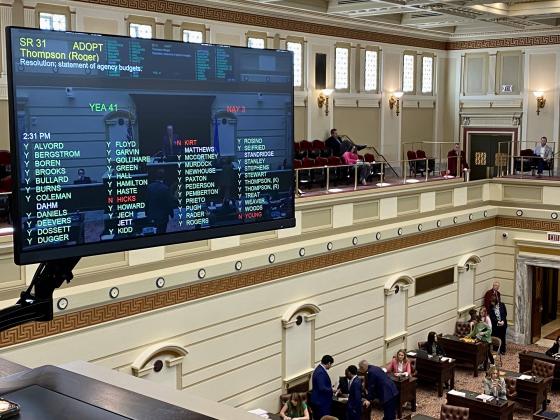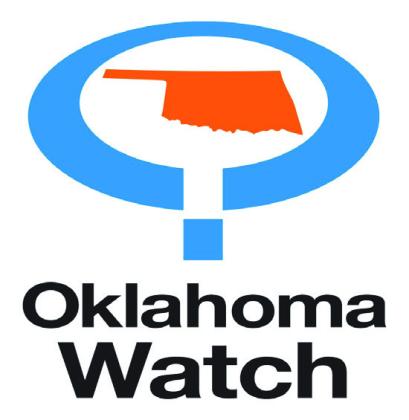What a difference a year makes.
Hundreds of bills have survived the Oklahoma Legislature’s first big policy deadline, new Republican leaders have been chosen, and the House and Senate are starting budget negotiations in the weeks leading up to candidate filing for this year’s election.
That’s in stark contrast to a monthslong stalemate over how to provide public funds for private schools that bogged down last year’s session to the point where a special session was ultimately needed to finish work.
The Senate voted this week to send its opening negotiating position on the budget to the House, part of a new transparency initiative touted by Senate President Pro Tempore Greg Treat, R-Oklahoma City. The $11.6 billion appropriation resolution passed by a vote of 41-3. Almost $331 million of that is to make up for the loss of revenue from the elimination of the state’s portion of the sales tax on groceries. Treat said that will be the only major tax cut contemplated by the Senate this year.
“It just underscores that we said what we meant and we executed beautifully on what we intended to do,” Treat told reporters on Tuesday. “We passed a budget that makes sure we keep our commitment to public schools, to infrastructure and healthcare. Obviously, it’s a first step. This is what we authorized our (appropriations) team to go negotiate, and we’ll have some back and forth.”
Even Senate Democrats who voted against the budget resolution credited the new process for giving their caucus more of a voice. They said their no votes came over policy differences and what they saw as a need to invest more in critical public services. Gov. Kevin Stitt’s executive budget proposed in February left most agencies with flat budgets.
“Unfortunately, agencies were artificially constrained in telling us what they really needed,” Sen. Julia Kirt, D-Oklahoma City said before Monday’s vote on the Senate budget resolution. “We did see that the executive branch limited what those agencies could request, so we saw a lot of flat budgets. I was challenged seeing some of the health and human services needs we have in this state, the increased costs, the increased needs of people in poverty and people with mental health conditions.”
Republicans in the House and the governor keep pushing for additional tax cuts beyond the elimination of the state sales tax on groceries. So far, the Senate has remained firm.
“We cannot do everything they sent us and balance the budget,” Treat said of several other House proposals for income tax cuts headed to the Senate.
Republicans, who hold supermajorities in the House and the Senate, took care of some internal business in recent weeks as they selected the next generation of leaders. Both Treat and House Speaker Charles McCall, R-Atoka, are term-limited. Candidate filing for state, county and federal offices will be April 3-5.
Majority Floor Leader Sen. Greg McCortney, R-Ada, won a GOP caucus election to become pro tempore-designate in the Senate. Rep. Kyle Hilbert, R-Bristow, the current House speaker pro tempore, won an election among fellow Republicans to become House speaker- designate. The formal votes to install them will come after the November election.
Hundreds of bills remain
The Legislature’s first major deadline signaled the death knell for hundreds of bills as they failed to make it out of their chamber of origin. After a short spring break, lawmakers will resume committee work on Monday to contemplate bills from the other chamber.
Several bills advanced that would make changes to the Oklahoma Energy Discrimination Elimination Act, which allows the state treasurer to restrict investments with financial firms perceived to be hostile to the oil and gas industry. Among them are House Bill 3541, by Rep Mark Lepak, R-Claremore. It would expand the law to cover agricultural, mining and timber industries. It passed the House by a vote of 78-15.
The House also advanced another Lepak bill, HB 1617, which was carried over from the 2023 session. It is based on a model bill offered by the American Legislative Exchange Council. HB 1617 would restrict the independence of pension plan trustees by having them use shareholder proxy advisory firms that promise not to back policies involving environmental or social initiatives.
The Senate passed SB 1536, by Sen. Dave Rader, R-Tulsa. It would have the attorney general mediate disputes between the state treasurer and pension plan administrators over exemptions taken in the Energy Discrimination Elimination Act. It stemmed from a dispute last year between Treasurer Todd Russ and the Oklahoma Public Employees Retirement System. Another bill, SB 1510, by Sen. Chuck Hall, R-Perry, would exempt cities and counties from the law. It passed the Senate by a vote of 42-1.
The House and Senate sent bills to the other side making changes to the regulation of medical marijuana or stepping up enforcement. Among them are HB 3361, by Rep. T.J. Marti, R-Broken Arrow, which would limit medical marijuana to only prepackaged items of 3 ounces or less. It passed the House by a vote of 57-23 and has an effective date of July 1, 2025.
HB 3458, by Rep. Anthony Moore, R-Clinton, would allow the Oklahoma Tax Commission to share additional information with the attorney general’s office, district attorneys and the Oklahoma Medical Marijuana Authority to combat money laundering related to illicit marijuana.
SB 1939 would increase the late fees for medical marijuana business license renewals to $500 per day. The bill, by Sen. Lonnie Paxton, R-Tuttle, is still a work in progress and addresses the transfer of business licenses. It was requested by the attorney general's office, the Oklahoma Bureau of Narcotics and Dangerous Drugs and OMMA. Similarly, SB 1635 would require business owners to submit a new affidavit saying they are in compliance with local zoning, building codes and safety regulations upon renewal of a business license.
Lawmakers continue to tweak the state’s Open Records Act and the Open Meeting Act, the state’s main government transparency laws. HB 3779, by Rep. Collin Duel, R-Guthrie, would require requesters to notify an agency or public official 10 days in advance if they plan to sue over a denial under the Open Records Act. HB 2730, a bill from last year’s session, made it out of the House this year. The bill, by Rep. Annie Menz, D-Norman, would require notification of delays in providing records if they can’t be produced within 10 business days.
Duel’s HB 3780 would clean up some references to videoconferencing put into the Open Meeting Act during the onset of the COVID-19 pandemic. HB 3937, by Rep. Melissa Provenzano, D-Tulsa, would clarify how public bodies provide meeting notices and agenda.
HB 2367, by Rep. Tammy Townley, R-Ardmore, spurred discussions on what would constitute a public meeting for the three-member Oklahoma Corporation Commission. The bill would allow corporation commissioners to discuss certain topics outside of a public meeting as long as those discussions are posted within five days on the agency’s website. The legislation is intended to enhance efficiency at the Corporation Commission, but longtime Commissioner Bob Anthony opposes it. Before approving the bill, by a vote of 54-32, the House added a sunset provision on July 1, 2026.
Other Bills to Watch:
- HB 3959, by House Majority Floor Leader Jon Echols, R-Oklahoma City, would create an incentive for professional sports teams. The proposal, capped at $10 million, would function like the state’s longtime Quality Jobs program that gives employers a quarterly rebate in exchange for creating jobs. The bill would apply to teams from the top five professional sports: football, basketball, baseball, hockey and soccer. It passed the House by a vote of 72-22.
- HB 3966 by Echols. This would direct the University of Oklahoma to establish the School of American Civic Thought and Leadership. Echols said the governor requested this bill. It is modeled after the School of Civic and Economic Thought and Leadership at Arizona State University. Since that initiative started in 2017, similar schools have been established at flagship public universities in Texas, Florida, Tennessee, North Carolina and Ohio.
- HB 4148, by Rep. Suzanne Schreiber, D-Tulsa, and Rep. Mark Lepak, R-Claremore, would require health-care providers or third-party debt collectors to tell the court they made the patient aware of the costs of care before a debt-collection lawsuit can proceed. The House advanced it off the floor by a vote of 86-0.
- SB 1430, by Hall, would break out the Central Purchasing division from the Office of Management and Enterprise Services into a separate agency and make the state purchasing director an appointee of the governor, with confirmation by the Senate. It passed the Senate by a vote of 42-3.
- SB 1218 by Sen. David Bullard, R-Durant. It would prohibit licensed dealers from refusing to sell a firearm to anyone age 18 or older unless they are otherwise prohibited under state law. It passed the Senate, 33-6.
Oklahoma Watch, at oklahomawatch.org, is a nonprofit, nonpartisan news organization that covers public-policy issues facing the state.


